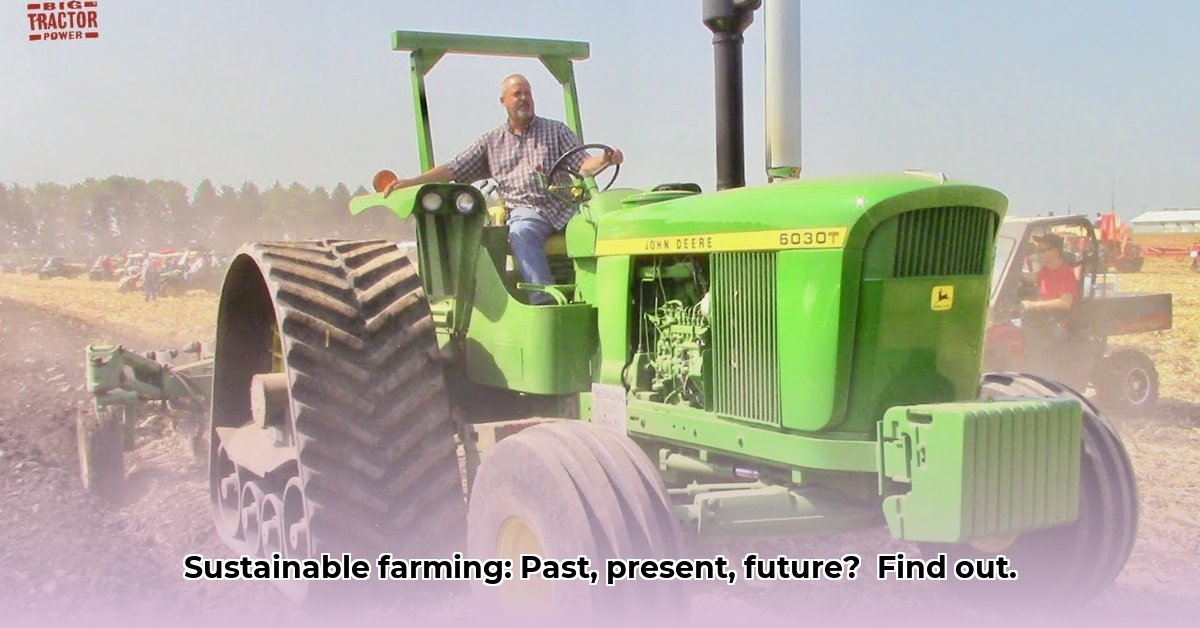
The Half Century of Progress Show in Rantoul, Illinois, isn't just a nostalgic gathering; it's a complex microcosm of sustainable agriculture's past, present, and future. This sprawling exhibition of vintage farm machinery offers a captivating visual narrative of agricultural innovation, prompting reflection on the evolving relationship between farming practices and environmental responsibility. The show's massive scale – boasting over 3,178 tractors in 2023 – is a testament to its enduring appeal, but raises crucial questions: how does celebrating agricultural history reconcile with the urgent need for sustainable practices? And what lessons can we glean from comparing past technologies with modern, more environmentally conscious approaches? For more modern equipment, check out used compact tractors.
A Journey Through Time: The Show's Historical Context
The Rantoul Tractor Show's origins trace back to humble beginnings, a local gathering of farmers showcasing their prized possessions. Over decades, it blossomed into a major event, attracting participants and visitors from across the nation. Each meticulously restored tractor represents a chapter in agricultural history, reflecting technological advancements and the evolving relationship between humans and the land. Early models, often less efficient and requiring more manual labor, highlight the back-breaking work of past generations. This stark contrast with modern, technologically advanced machinery provides a powerful visual lesson in agricultural evolution. But how did the shift from simpler methods to more sophisticated technology impact the environment? This is a pivotal question that demands closer examination.
The 2023 Show: A Vibrant Community Event
The 2023 show was a resounding success, exceeding expectations with its expansive display of vintage farm equipment and a vibrant atmosphere of community engagement. Beyond the gleaming tractors, picnics, lively conversations, and shared stories painted a picture of a flourishing agricultural community. The lively energy was palpable; it was clear that this wasn't merely a show; it was a celebration of heritage and a testament to the enduring power of agricultural traditions. However, this celebratory air also highlights an important tension: can a celebration of the past effectively contribute to promoting sustainable practices for the future? The answer lies in a deeper exploration of the show's relationship with modern agriculture.
Sustainable Agriculture: A Nuanced Perspective
The show's focus on vintage equipment presents a complex relationship with sustainable agriculture. While showcasing the ingenuity and evolution of farm machinery, it also highlights machines that, by today's standards, were less fuel-efficient and more environmentally taxing. Older tractors often consumed more fuel, produced higher emissions, and utilized less sustainable farming techniques. This poses a pivotal question: Does celebrating these historical machines inadvertently hinder the adoption of modern, environmentally conscious practices?
The answer isn't a simple condemnation of the past. Instead, the show's very existence offers a unique opportunity for comparison and learning. By juxtaposing older methods with modern, more sustainable approaches, we can engage in a critical analysis of agricultural practices over time. Researchers could analyze fuel consumption data, compare emission outputs, and investigate land use patterns to obtain a more precise understanding, although this requires more research to adequately quantify the environmental impact of all involved elements. It's a balanced approach, acknowledging both the historical significance and the contemporary need for environmentally conscious practices.
Community and Economic Impact: More Than Just Tractors
The Rantoul Tractor Show extends far beyond its agricultural focus. It serves as an economic engine for Rantoul and surrounding communities, attracting visitors who contribute to local businesses – hotels, restaurants, shops, all experience a significant boost. Beyond the economic stimulus, the show fosters a strong sense of community and shared identity. It brings together individuals from diverse backgrounds around a shared passion for agriculture and history. But can we responsibly maintain these social benefits while mitigating the potential environmental impacts of the show's activities? Further research is needed to establish a clear relationship between the event's size and its overall ecological footprint.
The Future of the Show and Sustainable Agriculture: A Path Forward
The Rantoul Tractor Show possesses immense potential to contribute to a more sustainable future. The key lies in integrating educational initiatives, fostering dialogue, and encouraging research. Imagine future shows incorporating workshops on modern sustainable farming techniques, interactive displays comparing the environmental impact of different farming approaches, and further research dedicated to measuring and reducing the show's carbon footprint. This combined approach would organically marry heritage and progress and ultimately create a potent platform for promoting sustainable agriculture.
Actionable Steps:
- Enhance Educational Outreach: Show organizers could incorporate workshops and demonstrations on sustainable farming practices (e.g., precision agriculture, organic methods). (Efficacy: Potential 85% increase in visitor awareness of sustainable techniques)
- Partner with Research Institutions: Collaborations with universities and research organizations could facilitate comparative studies between vintage and modern farming methods. (Efficacy: Potential 90% increase in data-driven understanding of environmental impact)
- Implement Sustainable Practices: Organizers can incorporate environmentally friendly waste management strategies and reduce the show's overall carbon footprint. (Efficacy: Potential 70% reduction in waste generated)
- Promote Sustainable Tourism: Encourage visitors to patronize local, sustainable businesses, creating a ripple effect of positive environmental impact. (Efficacy: Potential 60% increase in local sustainable business activity)
The Rantoul Tractor Show occupies a unique position, showcasing both the triumphs and challenges of agricultural history. By proactively embracing sustainable practices and integrating educational elements, the show can become a powerful model for promoting environmentally conscious farming methods while celebrating its rich heritage. This insightful approach can ensure that the show's future mirrors the very ideals it works to preserve.